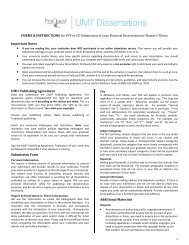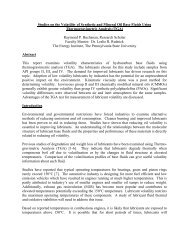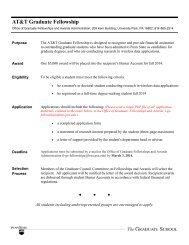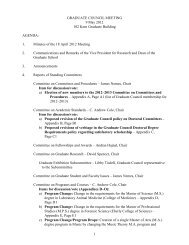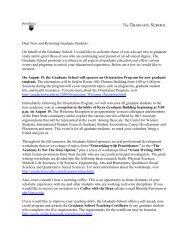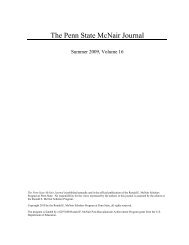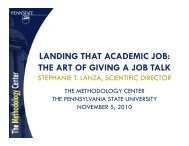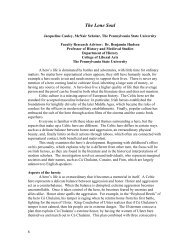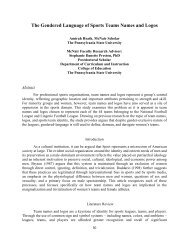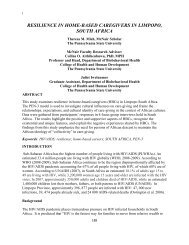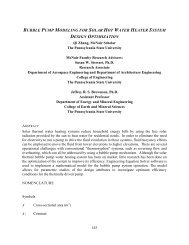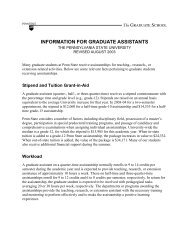1 GRADUATE COUNCIL MEETING 18 January 2012 102 Kern ...
1 GRADUATE COUNCIL MEETING 18 January 2012 102 Kern ...
1 GRADUATE COUNCIL MEETING 18 January 2012 102 Kern ...
Create successful ePaper yourself
Turn your PDF publications into a flip-book with our unique Google optimized e-Paper software.
Page F10<br />
9<br />
SYLLABUS SAMPLE<br />
CN ED 580 – Foundations of Counselor Education<br />
Fall <strong>2012</strong><br />
The Department of Educational Psychology, Counseling, and Special Education endorses the<br />
University and College policies on equity, tolerance, and affirmative action.<br />
Students are expected to be familiar with and behave in accordance with their professional ethics<br />
code and the University Code of Conduct. Failure to behave according to these codes will likely<br />
result in disciplinary action. Lack of familiarity does not absolve students of responsibility for<br />
their actions.<br />
Course Description and Objectives<br />
The purpose of this seminar is to provide students with opportunities to learn about the historical<br />
context and future challenges of counselor education, as well as current issues within the<br />
profession. They will also clarify their goals and expectations for the CE program. Throughout<br />
the semester, students will be encouraged to examine how the issues discussed influence: (a)<br />
their area of specialization, (b) the degree to which topics discussed might be areas of research<br />
interest, and (c) their goals and expectations while in the counselor education doctoral program.<br />
At the end of the semester, it is expected students will be able to:<br />
• Describe the CE program, its requirements, and the context in which it operates.<br />
• Identify and describe major historical and legislative events in counselor education.<br />
• Describe the roles and functions of counselor educators, the credentialing and licensure<br />
process, and professional organizations and associations.<br />
• Demonstrate an awareness and understanding of ethical and legal issues relevant to<br />
counselor education, as well as the role of advocacy.<br />
• Demonstrate an understanding of emerging societal issues, trends, and developments as they<br />
relate to counselor education.<br />
Course Readings<br />
Remley, T. P., Jr., & Herlihy, B. (2010). Ethical, legal, and professional issues in counseling<br />
(3rd ed.). Upper Saddle River, NJ: Merrill Prentice Hall.<br />
Readings available through electronic reserve from Pattee/Paternal Libraries.



